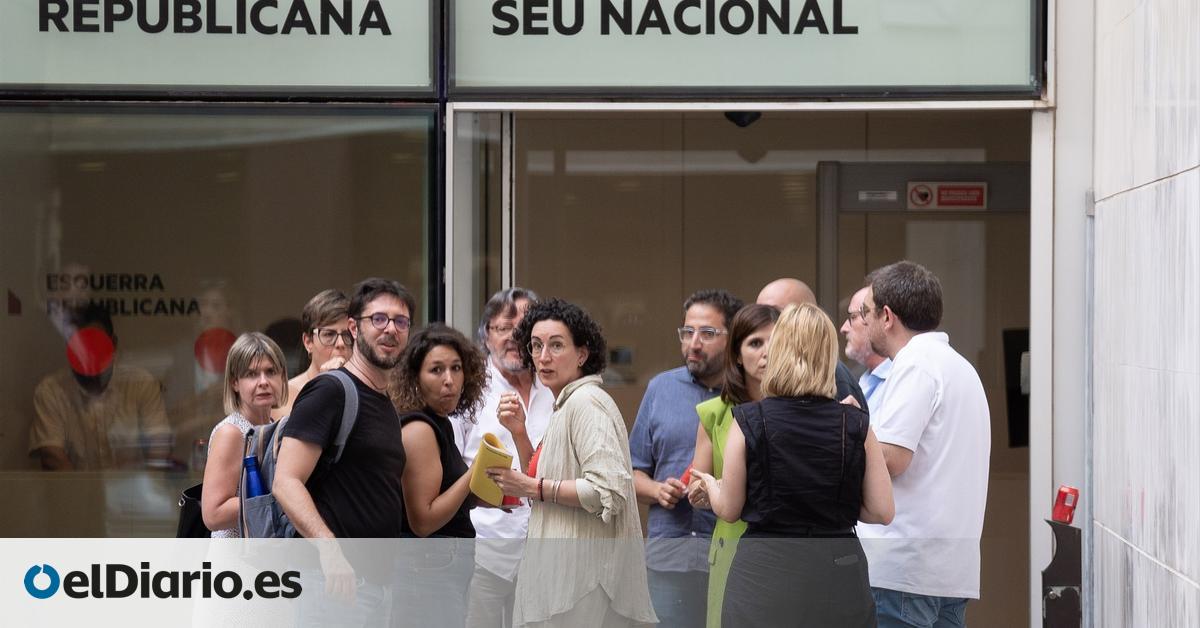
No ERC member could have imagined a couple of years ago, when the party was in the midst of electoral throes, the choice it must face this Friday. On the one hand, an agreement with important political conquests but which includes the investiture of Salvador Illa as president of the Generalitat. On the other, a ‘no’ that would lead Catalonia to a repeat election in which ERC would almost certainly come out worse off and which also does not seem likely to result in a very different parliamentary arithmetic.
Around 8,000 Esquerra members are called to vote on Friday on the document finalised between their negotiating team and the Catalan socialists. It is not the first time that the members have taken a position on a socialist investiture, such as that of Pedro Sánchez, but it is the first time that they will support a PSC candidate for the Generalitat.
That is why this referendum, whose results will be known shortly after 7pm on Friday, has a special aura. Unlike other times, it is not a matter of giving a mere boost to the negotiating strategy that ERC has been following since 2018 in Madrid, but rather of deciding the future of the Generalitat and, in turn, of the party. A ‘no’ is unlikely, but no one dares to rule it out outright.
The Republican rank and file must express their opinion in a climate of confrontation and crisis that the party has not experienced for more than a decade. ERC is hurt because it has suffered setbacks in the last four elections: general, municipal, Catalan and European. But, in addition, the recent scandal over the authorship of the posters against the Maragall brothers, concocted by the organization itself and which have not been fully clarified, have plunged the party into unrest.
As if all this were not enough, in recent months an impossible-to-disguise rift has opened up between the two leaders who have jointly held the helm of the party since 2011: Oriol Junqueras and Marta Rovira.
The secretary general and her core group of supporters were betting on a block withdrawal of the entire ERC leadership, as well as the exit from politics of the main figures of the Government. But Junqueras turned against these plans and resigned as Republican leader, but with the intention of standing again at the congress called for next November. The final battle will be fought then.
Meanwhile, the ERC executive, now with Junqueras out of the picture, has negotiated an investiture agreement with the PSC. The resulting document is an ambitious commitment on issues such as the financing of the Generalitat, the maintenance of some iconic ERC policies or the creation of a ministry for Catalan.
The main event is the economic and fiscal agreement that the PSC has been dragged into. According to the agreement, the Generalitat intends to assume the collection of all taxes in the community, gradually starting in 2025, and move towards a fiscal agreement model for Catalonia along the lines of that in force in the Basque Country and Navarre.
The pact has the unwavering support of the PSOE and the PSC, and has been praised by President Pedro Sánchez. The leadership of ERC is also defending the document tooth and nail to steer its supporters towards a favourable vote.
But the economic claim agreed by PSC and ERC has several obvious obstacles. The most obvious is the need to reform, at least, the law on financing of the communities (LOFCA), which as an organic law requires the support of an absolute majority in Congress. Parties such as Compromís or Chunta Aragonesista, both integrated in Sumar, have already expressed their rejection. A sufficient refusal to thwart the sum needed for the project.
Furthermore, doubts about the PSOE’s willingness to comply with the agreement have been hanging over the minds of the pro-independence militants from the very beginning. Although there have been many agreements reached with the socialists in the last legislature (pardons, reform of the Penal Code, amnesty), a part of the ERC rank and file continues to view with suspicion the degree of compliance of the Government with the agreements reached with the republicans.
This Wednesday, Oriol Junqueras spoke out for the first time about the pact with the PSC. He did so in an ambiguous manner, showing “respect” on the one hand, but also expressing understanding in the face of the “doubts” that it may generate. “The eventual support for the State government and the Catalan government by ERC will have to be validated with the development of the agreement and explicitly withdrawn in the event of non-compliance,” he resolved.
The former leader’s message was not exactly what was expected by the Republican leadership, which was counting on having, if not a boost, at least an unequivocally neutral position. However, Junqueras has chosen to show his distance from the document that is being put to the vote of a membership that, in large part, still considers him its main political reference.
However, both in the Republican leadership and among the Socialists, no one believes that Junqueras has any interest in clearly positioning himself against Illa’s investiture. Not even thinking about his options before the November congress. The former Republican leader is in favour of supporting the Socialists, with safeguards, and he has made this clear in some of the meetings with grassroots activists that he is holding these days.
Puigdemont’s earrings
Another of the important factors in the Republican decision has to do with Carles Puigdemont. Last weekend, the leader of Junts confirmed his intention to return to Catalonia if an investiture session took place, including that of his rival Salvador Illa, as he had announced during the electoral campaign.
The former president, unlike other politicians who have returned in recent weeks, such as Marta Rovira, has not been amnestied, which means that the arrest warrant against him issued by the Supreme Court remains active. For this reason, Puigdemont’s intention to be present in Parliament during the investiture could lead to his arrest and being brought before a court, a situation that the former president has avoided for the last 7 years.
The former president’s gesture shows a desire to put maximum pressure on the ERC rank and file, who would be forced to vote in favour of an investiture that, in parallel, would mean his arrest. Two events that, combined, could be a dish of very little pleasure for the Republicans.
Puigdemont’s self-immolation would also perhaps be the last opportunity for the Junts leader to introduce an element of political disruption in a Catalonia where there are no more prisoners, where dozens of people are being amnestied and where the independence movement has lost its parliamentary majority and the Government.
A consultation with an uncertain outcome
The Republican leadership’s forecast, at least before Junqueras’ position, was that the ‘yes’ to Illa would prevail in the consultation, although this time the leadership’s position had less support than in previous votes. “The agreement is solid and is being explained in detail to the membership. In addition, no one is promoting the ‘no’ internally,” assured sources close to the Esquerra leadership.
However, the PSC is looking at it more cautiously and fears the instability of a party in turmoil. “We have negotiated a generous agreement, but the bases [de ERC] They can use the consultation to show their rejection of the current leadership for reasons very different from those agreed,” said a source from the socialist leadership.
If the ERC membership votes yes to the agreement, Salvador Illa will have secured the support of 68 deputies, including the 6 from the Comuns who closed their own pact on Wednesday. An absolute majority that would allow Illa to be elected president in the first round, something that has not happened in Catalonia since the vote that made Puigdemont president in 2015.
Source: www.eldiario.es

